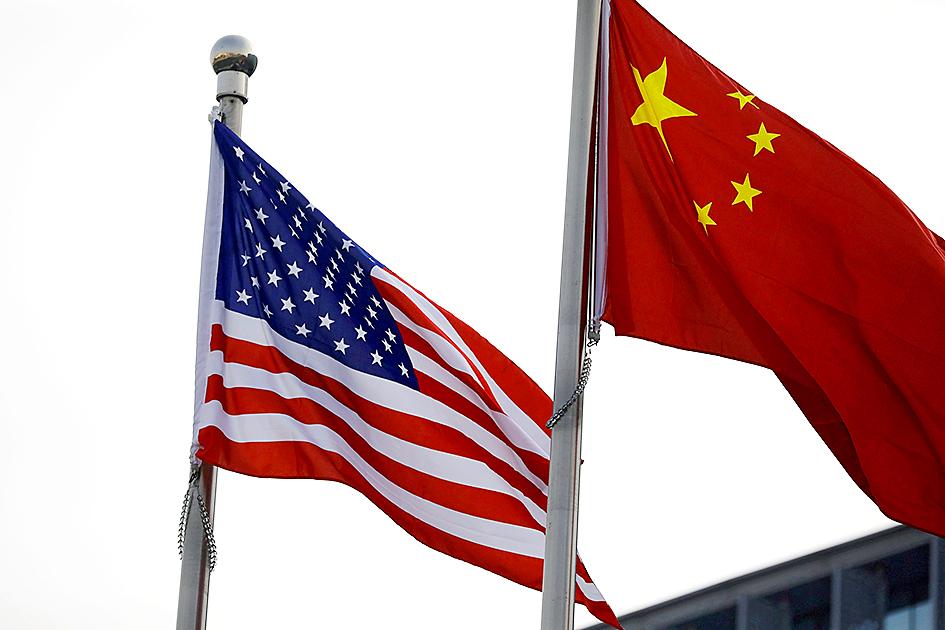By cutting some of its few communication links with the US military, China is raising the risk of an accidental escalation of tension over Taiwan at a critical moment, security analysts, diplomats and US officials said.
China called off planned formal talks involving theater-level commands, defense policy co-ordination and military maritime consultations on Friday as part of its retaliation against US House of Representatives Speaker Nancy Pelosi’s visit to Taiwan this week.
In an editorial yesterday, the Chinese Communist Party’s People’s Daily described the response, along with sanctions against Pelosi and her family, as “effective measures that fully demonstrate that China is fully determined and capable of safeguarding national unity and safeguarding ... sovereignty and territorial integrity.”

Photo: Reuters
US Naval Postgraduate School security expert Christopher Twomey said that the severing of the communication links is worrying, coming at what he believes is the beginning of a new Taiwan crisis.
China fired ballistic missiles over Taipei as part of four days of unprecedented military drills due to end at noon on Sunday.
“This increased density of forces, in the context of an intensifying crisis, raises the prospect for inadvertent escalation that neither side wants,” Twomey said, speaking in a private capacity.
“That is precisely the time you would want to have more opportunities to talk to the other side ... Losing those channels greatly reduces the ability of the two sides to de-conflict military forces as various exercises and operations continue,” he said.
As Chinese warships, fighter jets and drones maneuver around Taiwan, at least four powerful US vessels, including the aircraft carrier USS Ronald Reagan, the amphibious assault ship USS Tripoli and the guided missile cruiser USS Antietam are east of Taiwan, Reuters has confirmed.
Prospects are “extremely low for holding talks on risk reduction measures or stability,” said Bonnie Glaser, director of the Asia program at the German Marshall Fund of the United States.
Glaser said that she expects that the specific talks called off this week would resume over time, but “right now, China has to signal toughness and resolve.”
A US official, speaking on condition of anonymity, said Chinese officials had not responded to calls from senior Pentagon officials this week, but that was seen as China showing displeasure over Pelosi’s trip rather than the severing of the channel between senior defense officials, including US Secretary of Defense Lloyd Austin.
Austin pushed for improved communication between the rival forces when met Chinese Defense Minister General Wei Fenghe (魏鳳和) on the sidelines of the Shangri-la Dialogue security meeting in Singapore in June.
Asian and Western diplomats said that US military chiefs had been pushing for more frequent theater-level command talks for some time, given China’s growing deployments across Asia, where the US navy has traditionally been the dominant power.
The Pentagon said on Friday that China was overreacting, and the US was still open to building crisis communication mechanisms.
“Part of this overreaction has been strictly limiting its defense engagements when any responsible state would recognize that we need them now the most,” Pentagon acting spokesman Todd Breasseale said.

POSITIVE DEVELOPMENT: Japan and the US are expected to hold in-depth discussions on Taiwan-related issues during the meeting next month, Japanese sources said The holding of a Japan-US leaders’ meeting ahead of US President Donald Trump’s visit to China is positive news for Taiwan, former Japan-Taiwan Exchange Association representative Hiroyasu Izumi said yesterday. After the Liberal Democratic Party’s landslide victory in Japan’s House of Representatives election, Japanese Prime Minister Sanae Takaichi is scheduled to visit the US next month, where she is to meet with Trump ahead of the US president’s planned visit to China from March 31 to April 2 for a meeting with Chinese President Xi Jinping (習近平). Japan and the US are expected to hold in-depth discussions on Taiwan-related issues during the

‘LIKE-MINDED PARTNER’: Tako van Popta said it would be inappropriate to delay signing the deal with Taiwan because of China, adding he would promote the issue Canadian senators have stressed Taiwan’s importance for international trade and expressed enthusiasm for ensuring the Taiwan-Canada trade cooperation framework agreement is implemented this year. Representative to Canada Harry Tseng (曾厚仁) in an interview with the Central News Agency (CNA) said he was increasingly uneasy about Ottawa’s delays in signing the agreement, especially as Ottawa has warmed toward Beijing. There are “no negotiations left. Not only [is it] initialed, we have three versions of the text ready: English, French and Mandarin,” Tseng said. “That tells you how close we are to the final signature.” Tseng said that he hoped Canadian Prime Minister Mark Carney

President William Lai (賴清德) yesterday bestowed one of Taiwan’s highest honors on Saint Vincent and the Grenadines (SVG) Ambassador Andrea Clare Bowman in recognition of her contributions to bilateral ties. “By conferring the Order of Brilliant Star with Grand Cordon on Ambassador Bowman today, I want to sincerely thank her, on behalf of the Taiwanese people, for her outstanding contribution to deepening diplomatic ties between Taiwan and SVG,” Lai said at a ceremony held at the Presidential Office in Taipei. He noted that Bowman became SVG’s first ambassador to Taiwan in 2019 and

A man walks past elementary school artworks at the Taipei Lantern Festival in Ximen District yesterday, the first day of the event. The festival is to run from 5pm to 10pm through March 15.